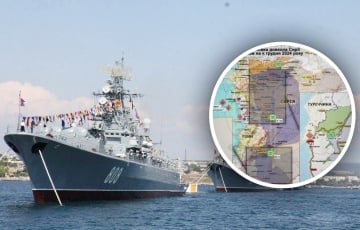‘Everything Might Fall Apart’: Kremlin Prepares To Say Goodbye To Military Bases In Syria
- 11.12.2024, 16:35
- 3,652

Russia is losing influence in both the Middle East and the West.
The rapid collapse of Bashar al-Assad's regime in Syria is likely to deprive Russia of its only naval base abroad, as well as military assets in which the Kremlin has invested hundreds of billions of rubles over the past nine years.
A complete Russian withdrawal from Syria, with the loss of the port of Tartus and the Khmeimim airbase, is likely, two Russian diplomats told The Moscow Times on condition of anonymity. The Russian military contingent in Syria, which at the peak of the pro-Assad campaign numbered tens of thousands of troops, has been blocked in its deployment sites after anti-Assad opposition forces established full control over the territories where Tartus and Khmeimim are located.
Russia has used its diplomatic and military channels to communicate with all the major players in the region — the opposition, Istanbul, Jerusalem, Washington and London — to convey that it “will use significant military force — aviation and missiles — if anything happens to its military personnel in Tartus and Khmeimim,” a Russian diplomat told The Moscow Times.
However, the success of this diplomacy is not guaranteed. “This will affect Russian logistics for supplying the Afrika Korps and all these ambitions of a regional presence. Everything could fall apart. An alternative could be found, for example, in Algeria, but in any case, everything will become much more complicated,” said Alexander Gabuev, director of the Carnegie Russia-Eurasia Center in Berlin.
The Assad regime and the opportunities it provided Moscow in exchange for support “were a very important trump card that we are now deprived of,” a source close to the Foreign Ministry told The Moscow Times. But he insists that what happened is “first and foremost a defeat for Iran, because Tehran invested more in Syria and lost more there.”
Without bases in Syria, Russia is losing influence in both the Middle East and the West, says Boris Bondarev, a former official at the Russian mission to the UN in Geneva who resigned in protest after the invasion of Ukraine.
“Since 2014, Putin has used this as a platform to force Saudi Arabia, Qatar, Iran, Egypt and Israel, and of course Western Europe and the United States, to reckon with him,” Bondarev said.
Two current officials, former military and diplomatic officials, insist that the situation is not so dramatic. According to one, Assad and Syria have become “a suitcase without a handle” for Putin, while the other notes that the costs of maintaining them have now been redirected to the campaign in Ukraine. “Additional Russian air force squadrons will now be deployed to target Ukrainian targets with a clear conscience,” he explained. The flight of Assad, who became the sixth foreign dictator to receive asylum in Russia after the collapse of his regime, has become a reputational problem for the Kremlin.
“Demonstrating that Russia does not abandon its people, unlike [US President] Obama, Putin can draw red lines and is ready to act from a position of strength, intervening in relatively distant regions and achieving his goals with brutality. Now all this has collapsed like a house of cards,” Gabuev notes.











